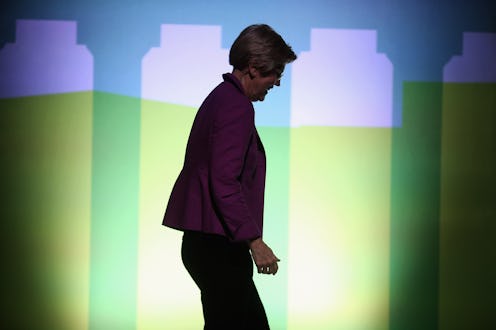News
Will Elizabeth Warren Endorse Bernie Sanders?
On Wednesday, a Democratic senator known as a progressive icon posted a fiery rant on Facebook about the danger of big banks. Bernie Sanders? No, it was Elizabeth Warren, whose lambasting of the "Too Big to Fail" banks very much mirrored Sanders' stance on them. "There would have been no crisis without these giant banks," she declared in her post. Here's what's curious: If she's with him on the banks, why hasn't Elizabeth Warren endorsed Sanders already?
Warren's Facebook post arrived in the wake of news that federal regulators have rejected giant banks' living wills, or resolution plans, for failing to persuade them that the banks could go bankrupt without disrupting the economy. Warren explained why this was so alarming:
This announcement is a very big deal. It’s scary. And it means that, unless these banks promptly address the concerns identified by the regulators, the government must push these banks to get smaller and less complex.
Warren went on to completely drag big banks through the mud, blaming them as the direct cause of 2008's financial crisis and holding their executives accountable for that fallout:
There would have been no crisis without these giant banks. They encouraged reckless mortgage lending both by gobbling up an endless stream of mortgages to securitize and by funding the slimy subprime lenders who peddled their miserable products to millions of American families. The giant banks spread that risk throughout the financial system by misleading investors about the quality of the mortgages in the securities they were offering...
Big bank executives got rich off that pipeline, but when it all predictably – yes, predictably – blew up, the government lavished their institutions with billions in taxpayer bailouts. None of those executives lost their jobs in exchange for the taxpayer rescue, and none of them went to jail for the rampant illegal activity that has been subsequently uncovered by the Department of Justice in bank settlement after bank settlement after bank settlement.
Cue mic drop. Warren ended by calling for legislators to "show some backbone, stand up to the revolving door culture that is pervasive in Washington, resist the millions spent on Wall Street lobbying and campaign contributions, and demand real changes at these banks." Well, Senator, I have good news for you! Someone is doing this, and his name is Bernie Sanders.
As of today, she has still not endorsed either Sanders or Hillary Clinton, while all of Warren’s fellow female Democratic senators have endorsed Clinton. In an interview with CBS in March, she said, "I don't have a timeline for this." In a Quora Q&A in the same month, she gave a reason: “There's a really important debate happening in the Democratic Party right now. I haven't said yet who I'm supporting because I think that debate is important and at this point don't want to tip the scales."
That doesn't mean Warren hasn't spoken out in support for either candidate. In December, she tweeted to say she stood with Hillary on her Wall Street reform plan.
And in January, she tweeted in support of Sanders, her fellow Democratic progressive.
But Warren has been particularly cozy with Sanders this past month. In a news conference in Massachusetts, she startlingly changed her style from only speaking about candidates' issues to speaking about the candidates themselves. Of Sanders, Warren said:
He’s out there. He fights from the heart. This is who Bernie is. He has put the right issues on the table both for the Democratic Party and for the country in general so I’m still cheering Bernie on.
The feeling is mutual. In March, talking about potential cabinet choices, Sanders said on The Young Turks: “There are other people that I would probably go to before Hillary Clinton, people like Elizabeth Warren for example."
Warren's signature gripes are Sanders' signature gripes — Wall Street bad, economic equality good. So what does all of this mean?
The circumstances surrounding Warren's endorsement are delicate and not a simple matter of aligned policy stances. There are several factors at play. The first is that, as a figurehead of the Democratic Party, the power of Warren's endorsement would be tremendous. She appeals to both Clinton's and Sanders' supporters, but an endorsement of either candidate would be seen as "taking a side," and could cause a deep divide in the party. At this point, when the race is so close between the two, an endorsement for Sanders or Clinton could alienate the other.
Personally, Warren's in a tight spot, too. She could lose an ally in whichever candidate she doesn't endorse. More importantly, Sanders versus Clinton poses a conflict of her political ideals versus the political reality. I imagine she probably wants to hold fast to her progressive platform, which would suggest favoring Sanders, but she also wants to be sure of a Democrat in the White House next year, for which statistics point more to Clinton, who leads the race. “Her prime directive is not to damage the party’s chances in November," a close Warren associate told Bloomberg in January.
Warren's relationship with Clinton is curious. There's the 2013 letter that Warren signed with other female Democratic senators urging Clinton to get into the race. Warren may still be expected to stand with a female Democrat. Clinton's Wall Street reform plan was already a big step to the left on economic policy, but Clinton must still sweat it out —and in that way, Warren's silence helps her and her goals for the party. Warren's hesitancy may influence Clinton to be more progressive.
Only Warren knows her real reasons for waiting it out. However, the first senator to endorse Sanders, Jeff Merkley, only announced his support on Wednesday. Major legislators are, perhaps, just beginning to jump in the pool with Sanders. Maybe Warren just doesn't want to be the first to test the political waters.
